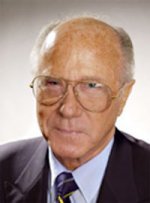 |
| 아노 드 보그라브 UPI 편집위원 |
정치적 예상이나 경제 예측이 점성술만도 못한 경우가 허다한 요즘 세상에서 확률을 비웃는 현대판 노스트라다무스가 있다. 뉴욕 포스트는 이렇게 전한다. “오늘날 노스트라다무스가 환생했다면 제럴드 셀런트를 따라잡는 데 애를 먹을 것이다.” 셀런트는 고객 기업들을 위해 세계의 사회, 경제, 사업의 추세를 파악하는 일을 전문으로 하고 있다.
셀런트의 정확한 예측 가운데는 1987년의 주가 폭락, 1991년의 구소련 붕괴, 1997년의 아시아 외환위기, 2007년 서브프라임 모기지 추문이 포함된다. 거시경제 학자이며 대공황 전문가인 벤 버냉키 연방준비제도이사회 의장이 “최악의 사태는 지나갔다”고 말하던 시기에 서브프라임 모기지 대출문제가 전 세계를 뒤흔들 것이라고 셀런트는 말했다. 그는 달러화의 대폭 평가절하가 있을 것이며 월가의 거대기업들이 완전붕괴로 치달을 것이라고 2007년 11월 UPI 기자회견에서 말했다. 그는 이런 사태를 ‘2008공황’이라고 불렀다.
셀런트는 이번 공황이 “대공황보다 더 심각하다”는 견해를 피력했다. 생활수준의 대폭적인 하락으로 시작되는 공황은 도시 하층민의 분노로 이어져 하층민은 갑부들의 호화생활을 가능케 했던 사회질서를 위협하게 된다는 것이다.
로스앤젤레스 타임스가 대중문화판 스탠더드 앤드 푸어스라고 소개한 셀런트의 트렌드 연구소는 2012년 무렵 미국인들의 세금 반란이 일어날 것이라고 예언한다. 식량 폭동과 공유지 불법 점거자들의 반란, 실직자들의 항의시위가 벌어지는 가운데 크리스마스 선물보다 식탁의 음식을 중시하는 문화가 등장한다는 것이다.
셀런트는 2012년 이후 “이 나라에 혁명이 일어날 것”이라고 말한다. 혁명은 무혈 쿠데타의 형태로 이루어질 것이며 제3당이 혜성처럼 나타난다는 것이다. 워싱턴 정가의 정통한 관측통들에게 이런 예언이 허풍으로 들리겠지만 에코노미스트와 같은 세계적 잡지의 “대다수 대학 교수진과 맞먹는 전문지식을 갖춘 25명의 전문가 조직”이란 높은 평가를 무시하기 어려울 것이다.
조지 워싱턴 블로그는 셀런트가 다양한 신문과 잡지, TV 쇼로부터 받은 모든 찬사의 목록을 게재했다. 그는 확실한 실적을 낸 바 있다.
거대한 미국 경제의 초석 가운데 하나는 중국과 일본을 비롯한 외국으로부터 빚을 얻는 능력이다. 미국은 세계 최고의 생활수준을 유지하기 위해서 매일 20억달러 내지 30억달러를 빌린다. 미국인들은 세계적으로 물자와 자원이 부족한 상황에서 지나친 소비에 바탕을 둔 생활을 하고 있다. 그런 생활은 반드시 변화하게 마련이다. 새로운 패러다임이 탄생하는 거대한 사회적 격변 없이는 미국인들이 검소한 사회로 갈 수 없다고 셀런트는 생각한다.
에너지와 물을 포함한 세계적인 자원 부족은 적어도 지역적인 자원 분쟁을 촉발할 것이다. 10만명이 넘는 인력과 16개의 기관이 근 500억달러의 정보비를 지출하는 미국 정부의 예측과 셀런트의 예상 사이에는 별로 큰 차이가 없다. 얼마 전 국가정보위원회가 발표한 ‘2025년의 세계 추세’란 제목의 보고서는 세계적인 분쟁 가능성을 지적한다. 다만 그 발생 시기가 2012년처럼 촉박하지 않을 뿐이다.
정보위원회 보고서는 중동문제가 악화되고 핵무기가 확산되어 미 중앙정보부의 주요 현안이 될 것으로 내다본다. 이 두 가지 문제는 “사하라 이남 아프리카에서부터 북아프리카와 중동, 발칸반도와 캅카스 지역을 지나 남아시아 및 중앙아시아와 동남아시아 일부에 걸친 지역의 정세를 불안에 빠뜨린다”는 것이다.
이 보고서가 지적한 가장 촉박한 현안은, 이란이 촉발하는 중동 전역의 핵무기 경쟁이 장거리 미사일 기술의 확산과 결합하여 지역 안보문제를 더욱 악화시키는 것이다.
미국은 2025년에 상대적으로 경제력과 군사력이 쇠퇴할 것으로 보고서는 전망한다. 대신 중국과 인도가 새로운 강대국으로 등장할 것이다. 앞으로 20년 동안 그 어느 나라보다 중국의 국제적 역할이 커질 것이다.
아노 드 보그라브 UPI 편집위원
워싱턴 타임스·정리=오성환 외신전문위원
Nostradamus redux
Arnaud de Borchgrave
Although political forecasting and economic prognostication have long made astrology look respectable, there is still a latter-day Nostradamus who has defied the odds. "If Nostradamus were alive today," said the New York Post, "he'd have a hard time keeping up with Gerald Celente" - the man who tracks the world's social, economic, and business trends for corporate clients.
Mr. Celente's accurate forecasts include the 1987 stock market crash, the collapse of the Soviet Union in 1991, the 1997 Asian currency crash, the 2007 subprime mortgage scandal that he said would soon engulf the world at a time when Federal Reserve Chairman Ben Bernanke, a macroeconomist and expert on the Great Depression, told us, "the worst is behind us." In November 2007, Mr. Celente also told UPI a massive devaluation of the dollar was coming and that some Wall Street giants were headed for total collapse. He called it "The Panic of 2008."
"Worse than the Great Depression," Mr. Celente opined. Beginning with a sharp drop in standards of living, and continuing with an angry urban underclass that threatens a social order that allowed the mega-rich to continue living behind gated communities with summer escapades to luxurious homes on the French and Italian Rivieras or to bigger and better and more expensive boats from year to year.
This time, Mr. Celente's Trends Research Institute, which the Los Angeles Times described as the Standard & Poor's of pop culture, can see a tax rebellion in America by 2012, food riots, squatter rebellions, job marches and a culture that puts a higher premium on food on the table than gifts under the Christmas tree.
Mr. Celente says, "There will be a revolution in this country," though not until 2012, and it will take the form of a bloodless coup and the meteoric rise of a third party. While all this sounds like claptrap to sophisticated observers inside the Beltway, one can't ignore the high marks his forecasting gets from such prestigious global publications as the Economist: "A network of 25 experts whose range of specialties would rival many university faculties."
The George Washington blog listed all the kudos Celeste Celente received from a wide variety of newspapers, magazines and television shows. He has a solid track record. The catastrophe that is about to hit our nation, he says, has its origin in wars we were told would be "off budget" and would not affect more tax cuts. This is the school that says there's nothing wrong with a little deficit funding.
One of the cornerstones of America's giant economy is the ability to borrow from other countries - primarily China and Japan - from $2 billion to $3 billion a day in order to maintain the world's highest standard living, which is based on conspicuous consumption, at a time of growing world shortages. That was bound to change. But Mr. Celente does not believe we can switch to a thrifty society without a gigantic upheaval from which a new paradigm will emerge.
On a global scale, scarce resources, including energy and water, will, at the very least touch off regional resource conflicts. Mr. Celente is not that far removed from what the 100,000-strong, 16-agency Intelligence community has been doing with its almost $50 billion Intel budget. A report released by the National Intelligence Council (NIC) this week, titled "Global Trends 2025," points to global mayhem, but not as soon as 2012, or in three years time, as Mr. Celente predicts.
The Mideast and nuclear proliferation, says NIC's report, will continue to be the CIA's principal concern inside the "great arc of instability stretching from sub-Sahara Africa through North Africa and the Middle East, the Balkans, the Caucasus, South and Central Asia and parts of Southeast Asia."
NIC's most immediate alarm is "The Prospect of a nuclear-armed Iran spawning a nuclear arms race in the greater Middle East will bring new security challenges to an already conflict-prone region, particularly in conjunction with the proliferation of long-range missile systems."
By 2025, NIC also says the United States will have to face the prospect of a relative decline of its economic and military power. In the interim, new superpowers will have emerged in China and India. And China is "poised to have more impact on the world over the next 20 years than any other country."
Iraq, following a U.S. withdrawal at the end of 2011, will have to face many conflicting tribal and ethnic groups that could easily explode and spill over into neighboring states. The perennial Mideast conflict over the creation of a state for Palestinians will certainly not be settled by the time President Bush leaves office. And it will retain its lethal potential for sudden eruptions of violence and wider conflict.
Behind the scenes, Palestinians mutter darkly about a "one-state solution displacing the two-state approach." The secret Palestinian weapon is quite simply demographics. Since creation of the state of Israel in 1947, Arabs have gone from 87 million to 310 million. They expect to be half a billion by 2025.
Assuming President Obama can revive the long-playing peace process and come up with a new road map to peace, it will be a nonstarter if it doesn't include Arab East Jerusalem as the site of the Palestinian capital. For Israel, Jerusalem is a red line, a capital that cannot be shared.
prognostication:예측 escapade:탈선행위 squatter:공유지 불법 점거자 meteoric:화려하게 나타났다 사라지는
Copyright ⓒ 세계일보. 무단 전재 및 재배포 금지
![[설왕설래] 탈모보다 급한 희귀질환 급여화](http://img.segye.com/content/image/2025/12/25/128/20251225508091.jpg
)
![[기자가만난세상] ‘홈 그로운’ 선수 드래프트 허용해야](http://img.segye.com/content/image/2025/12/25/128/20251225508065.jpg
)
![[세계와우리] 줄어든 도발 뒤에 숨은 北의 전략](http://img.segye.com/content/image/2025/12/25/128/20251225508090.jpg
)
![[조경란의얇은소설] 타자를 기억하는 방식](http://img.segye.com/content/image/2025/12/25/128/20251225508072.jpg
)








